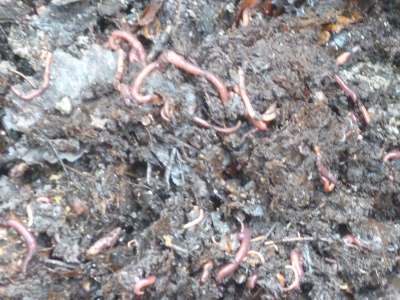
by Trina
(Florida)

worms doing what they do best, making worm castings
Hello Jacki. I have read in your site the use of worm castings for most succulent questions sent to you.
I am new to this organic fertilizer and would like to switch.
I found website sources which says worm casting in a bag (looks like soil in the picture) and another they call worm casting tea sold by the gallon.
Which one should I use or do I have to use both?
How do I use it, how often and how much do I use?
Can I use one or both when propagating from leaf or stem cuttings?
Can I use it for container succulents as well as for the ones planted in the ground?
Is it good for all succulents – aeonium, echeverias, aloes, agaves, etc? Hope you can help me again with my never ending questions. Thank you!
Hi Trina – phew! Lots of questions!
I usually use the dry castings, for a couple of reasons; they are easy to store, odorless and dry, so there is no mess to using them. I sprinkle a teaspoon or so close to the stem of established plants in pots, or in ground.
The biggest advantage is that because I use lava rock mulch a lot (which is expensive) the castings find their way through the mulch to the soil surface as you water.
The worm castings can also be mixed with the soil, or sprinkled on once the seedlings or cuttings get to the stage when they stall; usually this will be fairly obvious, because they run out of energy, and maybe look a little pale. This will indicate that they need a pick me up of more dry castings which act as a slow release fertilizer, or use the tea for faster results.
I would certainly try the tea for large container plantings later in the summer perhaps – I make my own, just put some worm castings in a large bucket, and fill it with water. The commercially made tea might be much more expensive, for very little added benefit.
You will have to see if it’s a concentrate, in which case must be mixed with water, or already diluted to the right ratio. Don’t use this on young plants, or when propagating, because it could be too strong.
I find worm castings are relatively mild, so they are good for all kinds of plants. Keep in mind that succulents in general don’t like a rich soil, and they won’t appreciate it in the same way as other house plants. All things in moderation!
Hope that helps sort out the fertilizer questions,
Jacki
Comments for Worm Castings: Dry or Liquid
Apr 10, 2013
Worm Castings
by: Trina
Everything is much clearer now with the worm castings. I was also about to ask you about my cuttings and leaf propagation. Now I understand the delay in growth. They are indeed stalling! I’d better get me those worm castings ASAP! Thanks again!

